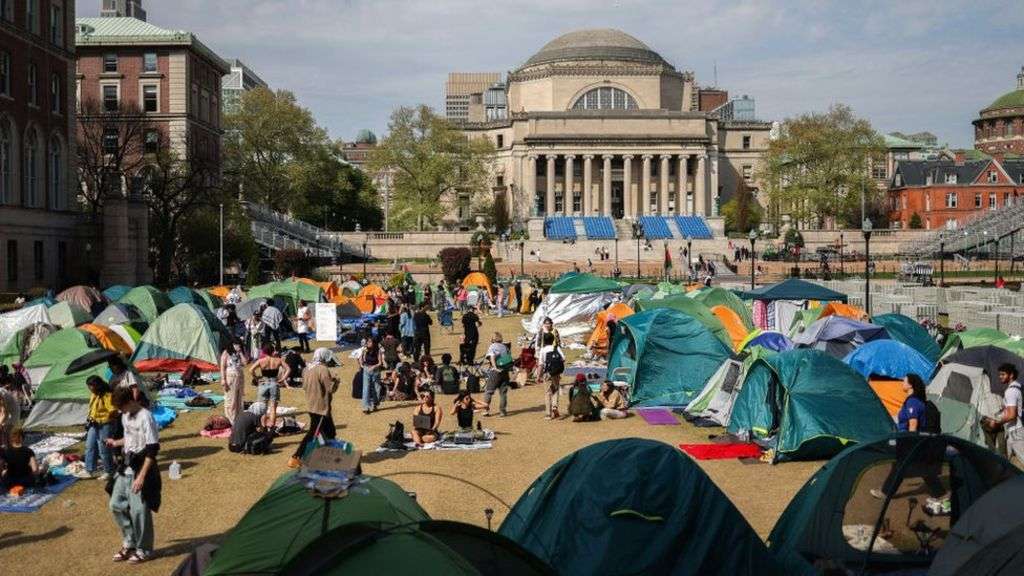Columbia University administrators have ordered students participating in an ongoing pro-Gaza campus encampment to disband or face disciplinary action. In a letter on Monday, the school warned of interim suspensions for all students who do not voluntarily leave the protest by 1400 EST (1800 GMT). The Ivy Leaguer school's embattled president has acknowledged talks with student organisers were at an impasse. The revolt at Columbia has inspired similar action at dozens of colleges. And now the New York university has become the focal point of the country's debates over the war in Gaza and US support for Israel, as well as fears that antisemitism is putting Jewish students in danger. "It is past time for the university to act decisively, disband the encampment, and ensure the safety and security of all of its students," a group of Democratic lawmakers wrote on Monday in a letter to the school's board of trustees. The letter, signed by leading pro-Israeli voices and high-profile Jewish members of Congress, described the encampment as a "breeding ground for antisemitic attacks on Jewish students". "The time for negotiation is over; the time for action is now," the 21 Democrats wrote, calling on board members to resign if they were unwilling to act.
Earlier this month New York police raided a pro-Palestinian encampment in the campus centre and arrested more than 100 students. Activists redoubled their efforts, regrouping into another encampment and prompting university leadership to move to hybrid learning.
On Monday morning, university president Nemat "Minouche" Shafik revealed in a statement that "since Wednesday, a small group of academic leaders has been in constructive dialogues with student organizers to find a path that would result in the dismantling of the encampment".
"Regretfully, we were not able to come to an agreement," she said.
Over the weekend, the school denied rumours of "an impending lockdown or evictions on campus" and told students it had no plans to bring back police "at this time".
But in a new letter circulated to encampment organisers, the school warned it "will need to initiate disciplinary procedures because of a number of violations of university policies".
Students were instructed that, if they voluntarily leave the protest and sign a form accepting "an Alternative Resolution" by 1400 local time, they will be allowed to complete their semesters.
Those who do not will be unable to close out the semester and will be temporarily barred from campus, with those scheduled to graduate no longer eligible to do so.
Columbia Students for Justice in Palestine, one of the main groups involved with the encampment, vowed to defy the order in a post on X, formerly Twitter, and called on activists to "protect the encampment".
"Do not sign anything with administration," the group wrote.
The Columbia uprising has sparked similar acts of rebellion by students across the country, with the OceanNewsUK tracking protests or encampments on campuses in at least 22 other states and Washington DC.
Protesters are calling for a ceasefire in the Israel-Hamas war and many are demanding that the institutions they attend financially divest from Israel.
In her statement on Monday, Dr Shafik said that while Columbia plans to explore range of ideas to better address divestment matters and other student concerns, it "will not divest from Israel".
At the same time, amid alleged incidents of hate speech, harassment and threats of violence by some participants, Jewish students have voiced concern about their safety on campus.
Frustration is growing across the US, with hundreds more protestors arrested this weekend on campuses as far apart as Washington University in St Louis, Missouri and California State Polytechnic University in Humboldt, California.
Monday's letter from House Democrats is one piece of a party coalition increasingly fractured over the handling of the war in Gaza.
The House is scheduled this week to discuss legislation poised to dramatically expand the definition of antisemitism by making certain language and chants on college campuses punishable under federal anti-discrimination law.
Thirteen Democrats are sponsoring the bill, and an eventual vote on the measure could further reignite the party's divisions.
On Sunday, White House national security spokesman John Kirby told ABC News that the president respects the right of peaceful protest but "we don't want to see anybody hurt in the process".








